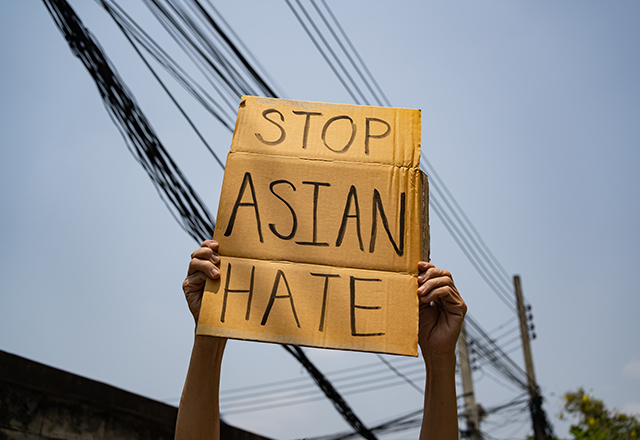Before 2016, my experiences with racism mostly came in the form of relatively harmless comments that I could brush off — events that I could laugh about later with a friend. The time at a sushi restaurant when I got asked where the menus were, despite not wearing the restaurant’s uniform. The time when someone, taken aback with surprise, told me that my English was so good. The time at the library when a stranger came up to me and my friends and told us that “All you Asians study too hard, you’ve got to relax and stop killing the curve for everyone else.” The hundreds of times I’ve been asked, “Where are you from?” only to receive the inevitable follow up question: “No, but where are you really from?”
In recent years, this underhanded prejudice has given way to outright assaults and hate speech. Even before the COVID-19 pandemic, Americans had become increasingly emboldened in expressing their racist hate.1 My own experiences reflected this change.
One sunny afternoon on Pratt Street, I was on my way to the grocery store when a person shouted at me, asking if I was Chinese. Taken aback, I responded that I wasn’t and kept walking.
I was completely unprepared for what came next. The person started walking toward me, yelling that I was a North Korean communist and telling me to get out of the United States — the place that I have called home for my entire life. I began walking faster. A beat later, so did they. Heart racing, I ducked into a nearby store and stayed there for 10 minutes, waiting until they left the area.
I didn’t talk about this experience to friends and family. Instead, I wrote it off as a one-time event, buried it deep in the back of my mind and hoped it would never happen again.
However, recent reports of verbal and physical assaults against the AAPI community have caused this memory to resurface. The United States is dealing with a staggering rise in hate crimes against AAPI, largely attributed to the incendiary rhetoric blaming China for COVID-19 and nicknaming it as “the China virus” and “Kung Flu.” Every week, the news is peppered with stories about assaults against the AAPI community.
While these attacks are horrifying in their own right, they are accompanied with another appalling aspect — bystanders who do nothing to help the victims. Inaction is nefarious, communicating a tacit approval of the atrocities taking place. Notably, in New York, a 65-year-old woman was brutally beaten while witnesses in a hotel lobby did nothing to intervene, not even calling 911. When the assault was over, one of the bystanders closed the door to the hotel as the victim lay bruised and helpless on the sidewalk outside. This apathetic act spoke volumes to me: It told me that America did not care, that America condoned this violence, and that America did not see the woman as a human being who needed help.
These days, there are always two questions in the back of my head. Will this ever happen to my family? And: If it does, will anyone step in to help?
Intervening during a racist attack is not easy. Doing nothing is the path of least resistance, and diffusion of responsibility and fear of retaliation are difficult to overcome. Alteristic, a nonprofit consulting agency, categorizes intervention strategies into the three Ds: Direct, Distract, and Delegate. A direct intervention tackles the event head-on, either disrupting the perpetrator or checking in with the person at risk. Distractions focus on diffusing the situation. Examples of this include accidentally spilling a drink or asking the person at risk to borrow a charger. And finally, delegation consists of enlisting help from others. For example, if the harassment is occurring in a store, an active bystander may delegate by alerting a store manager to the situation. Importantly, do NOT call for police unless the person being harassed indicates that they would like this. For many communities that experience harassment, this could create a greater danger for the person at risk.
As the number of hate crimes against AAPIs has grown, I have heard more and more personal anecdotes from friends and acquaintances who have experienced their own versions of this harassment. I have yet to be targeted as a COVID scapegoat, but the stories on the news are a constant reminder. It could have been me. It could have been my parents.
The violence and vitriol that the AAPI community has faced is abhorrent, but the power to combat bigotry is within reach. If, as bystanders, we can find the courage to intervene and help our fellow humans, we can show that America will not tolerate racism. So, one question remains: Will you stop Asian hate?
Ways to support the AAPI community
- The AAPI community fund: gofundme.com/f/support-aapi-community-fund
- The Asian Mental Health Collective: asianmhc.org/about-us/#donate
- Send Chinatown Love: sendchinatownlove.com
- How to be an active bystander:
- Bystander intervention training: advancingjustice-aajc.org/events
- Additional resources from the JHU Office of Diversity, Inclusion, and Health Equity: hopkinsmedicine.org/diversity/resources/racial-discussions.html
References
- Newman, B., Merolla, J., Shah, S., Lemi, D., Collingwood, L., & Ramakrishnan, S. (2020). The Trump Effect: An Experimental Investigation of the Emboldening Effect of Racially Inflammatory Elite Communication. British Journal of Political Science, 1-22. doi:10.1017/S0007123419000590
Related content
- ‘We’ve Always Been Here’: Student Groups Continue to Fight for Equity in Academia
- Johns Hopkins Physicians Stand With You
- Underrepresented minority biomedical researchers: numbers, challenges and initiatives for change
Want to read more from the Johns Hopkins School of Medicine? Subscribe to the Biomedical Odyssey blog and receive new posts directly in your inbox.

Pingback: Healing Together | Biomedical Odyssey
Comments are closed.